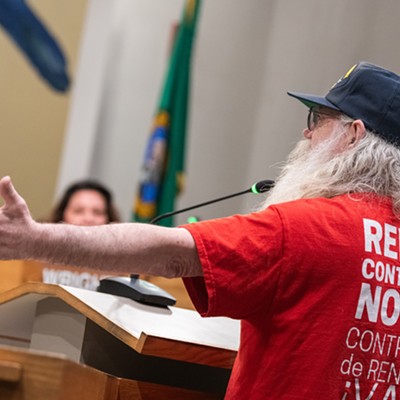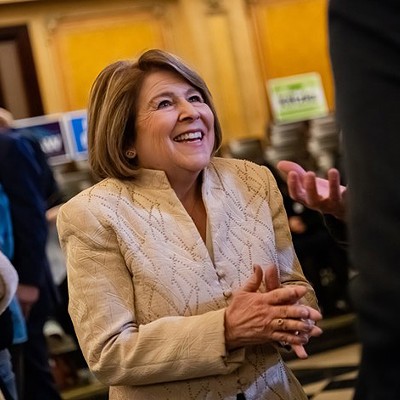
With closely cropped, graying hair and notecards sticking out of his short-sleeved dress shirt, Doug Perry, an attendee at Congresswoman Cathy McMorris Rodgers' August town hall, didn't look like the stereotypical dude asking questions about weed.
He said he's a conservative. A cancer survivor. He'd voted for McMorris Rodgers.
But there was one thing he didn't understand: Why was she so opposed to legal marijuana? He'd never used the stuff, but what about cancer patients who needed it to relieve their suffering?
"As [Attorney General] Jeff Sessions has publicly stated, he intends to prosecute marijuana users and businesses. Are you agreeing with that?!" Perry asked. He shook his head incredulously. "Or are you against that stand? I'm very interested to know."
The crowd erupted in applause.
"Right now it's against the law at the federal level," McMorris Rodgers said in her response. "I would support his efforts."
Last week, that question stopped being theoretical, as Sessions announced he would be striking down the Cole memo, an Obama-era Department of Justice policy taking a largely hands-off approach toward enforcing the federal prohibition in states that have legalized the drug.
Theoretically, it means federal prosecutors in states that legalized marijuana, like Washington and Colorado, could prosecute businesses selling or growing weed.
For Republicans like McMorris Rodgers, the decision creates a tension between the anti-drug contingents of their party and those who've often called for the federal government to back off and let the states be laboratories of democracy.
At the August town hall, McMorris Rodgers explained her opposition to legalized marijuana — medical or recreation — from the perspective of a mother.
"I think about my kids. I think about access to marijuana," McMorris Rodgers said. "I have a lot of concerns on this is taking us and where it's going to lead."
In particular, McMorris Rodgers suggested that legalizing marijuana could exacerbate the opioid crisis, arguing that marijuana is a gateway drug to more dangerous substances.
"I think marijuana is a part of leading to more abuse and more addiction in this country," she said.
The research on that claim is mixed. On the one hand, one recent National Institute on Drug Abuse study suggested that marijuana users were more likely to become addicted to prescription opioids than non-users. But other studies have suggested that opioid abuse and overdoses have actually fallen in states with legal medical and recreational marijuana.
Either way, the political tides on the issue have clearly been shifting: Thirty years ago, only a quarter of Americans supported legalizing marijuana. But a Gallup poll in October showed that, today, nearly two-thirds do. Even a majority of Republicans supported legalization. Back in 2012, around half of McMorris Rodgers' Republican-leaning district had voted for Initiative 502 to legalize marijuana.
Last week, though, McMorris Rodgers didn't exactly leap to support Sessions like she had in August. Instead, she declined to be interviewed by the Inlander, her staff saying she needs more information.
"The congresswoman wants to look deeper into how this decision will impact states, like Washington, who have already legalized marijuana," says Jared Powell, spokesman for McMorris Rodgers.
By contrast, former Washington State Senate Majority Leader Lisa Brown, who hopes to unseat McMorris Rodgers in November, doesn't hesitate to wade in. Supporting Sessions or saying "more information is needed," Brown says, is a cop-out.
"There is now a cloud of uncertainty for businesses that are operating in Eastern Washington," Brown says. "I've heard from growers, I've heard from consumers, from people who are very concerned about the implications for the banking system."
But she also chooses her comments carefully. Brown says she supported Initiative 502, and calls for more support for scientific research on the issue, but declines to speculate on what Washington state can learn from its legalization of marijuana. While some Democrats, like Sen. Cory Booker of New Jersey, had called for the nationwide legalization of marijuana, Brown declines to join them.
"I don't have any interest in telling other states where they need to go on the issue," Brown says.
Instead, she says she supports a bill from a pair of Oregon legislators that would officially allow states to legalize marijuana without fear of federal interference. Washington's voters, she says, have made their preference clear.
"I'm mostly listening to what people have to say about the issue," Brown says. ♦





















